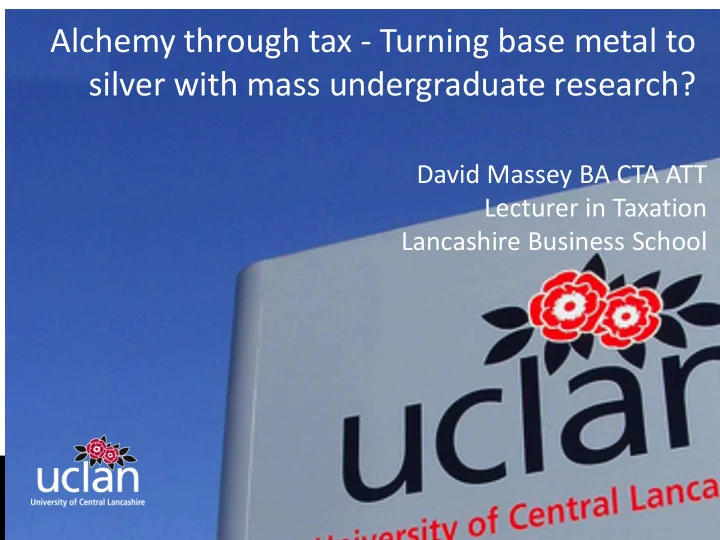

Alchemy through tax - Turning base metal to silver with mass undergraduate research? David Massey BA CTA ATT Lecturer in Taxation Lancashire Business School INNOVATIVE THINKING FOR THE REAL WORLD
McKerchar (2005) “Many tax academics are alone in their Faculties in this subject area. Interaction with students becomes a rewarding and challenging part of this job. Getting students curiosity aroused also provides stimulation for you. You have common ground to explore – your peers on staff are not usually all that interested in tax (unless they want specific advice on a personal matter and seek you out) . Who else is going to listen to your love of taxation so avidly?” McKerchar, M. (2005) “An appraisals of research-led teaching in the context of taxation: can both teacher and student benefit?” JATTA, Vol. 1. No.2. Page 495 (emphasis added) INNOVATIVE THINKING FOR THE REAL WORLD
Occupational Psychosis? INNOVATIVE THINKING FOR THE REAL WORLD
University of Central Lancashire 1828 founded as the Institution for the Diffusion of Useful Knowledge Current Slogan INNOVATIVE THINKING FOR THE REAL WORLD
Rugby League World Cup 26 October to 30 November 2013 INNOVATIVE THINKING FOR THE REAL WORLD
Learning and teaching Tax at UCLAN • Final year module (AC3600) for accounting students • Exemption from foundation tax papers of major UK accounting bodies 2011-12: 65 students • 10 students from overseas (China, Cyprus, Hong Kong, Libya, Poland, Saudi Arabia, South Africa) • Home students – typical entry grades 240 UCAS points (3 Cs at A- level) and about 75%: • still live at home • will not leave the North-West of England in search of work INNOVATIVE THINKING FOR THE REAL WORLD
Is it actually worth learning tax? What is the benefit of a detailed knowledge of the ephemeral facts about UK tax: for overseas students? • for home students? • INNOVATIVE THINKING FOR THE REAL WORLD
The Office of Tax Simplification (OTS) • Set up by the Coalition in July 2010 to “provide the Government with independent advice on simplifying the UK tax system” • “a staff, effectively, of slightly under six” • An early project was the simplification of tax for the very smallest businesses INNOVATIVE THINKING FOR THE REAL WORLD
Simplifying tax for the very smallest businesses – in a rush 28 July 2011 - Initial report identified areas for further research , including how simplification had worked (or not) in other countries – but no resources to follow these up . Recommendations due to ministers in time for proposals to be included in the Budget in March 2012 Project agreed with OTS - breadth and speed mattered more than depth • We would try to cover as many countries as we had students • Work would start in Week 1 of teaching ( 15 September ) • OTS would visit campus on 20 October and the students would present their reports INNOVATIVE THINKING FOR THE REAL WORLD
Public feedback from OTS “We are grateful to the students at the University of Central Lancashire who carried out a research project for a module on taxation during their 2011 autumn term, guided by their lecturer, David Massey. The project was to identify and research alternative tax systems around the world. Although this was only at an initial level and based on desktop research, we were impressed by the quality of the work produced by many of the students. Their work helped us identify trends and alternatives for further investigation” “Small business tax review, Final report: Simpler income tax for the smallest businesses”. February 2012 , page 47 INNOVATIVE THINKING FOR THE REAL WORLD
Getting the students on board • Graded coursework – increased to 35% of the Module marks (with an optional exam question covering the topic) • Setting high expectations • Keeping it relevant: no Harvard referencing links to employability demonstrating that their work mattered to (and would be read by) someone outside the University Overseas students researching their home tax system • Real deadlines linked to an event • Accepting the risk that this could all go “pear-shaped” but that was worth giving it a go. INNOVATIVE THINKING FOR THE REAL WORLD
Doing the research • Very ad hoc • Mainly online desk research • Soon apparent that many students are not digital natives • Daily face-to-face and online discussions • Very mixed success (but credit given for process – research diary, reflection, participation – and report marks based on what was done with what was available.) INNOVATIVE THINKING FOR THE REAL WORLD
Some student reaction “The coursework set in AC3600 arguably answered one of my personal grievances with coursework in general, in that coursework is very rarely grounded in reality or interacted with by people beyond the marker. By being presented to the OTS and used as groundwork for their own future research leading to government recommendations, it made the coursework both meaningful and engaging as it would have real world implications.” INNOVATIVE THINKING FOR THE REAL WORLD
When would flashmob/crowdsourcing of undergraduate research work best? I would suggest that we require: • a small discrete problem, which • matters to someone other than the tutor, but • would otherwise be neglected, where • the students’ contributions can be recognised before the end of the Module/Unit, and • every contribution can count INNOVATIVE THINKING FOR THE REAL WORLD
Challenges to be resolved • Time required for supervision • Research and professional ethics if primary research undertaken INNOVATIVE THINKING FOR THE REAL WORLD
Ephebagogy? Training for Athenian citizenship (late teens and early twenties) Spirituality • Combat • Democratic participation • History • Camaraderie • Can we provide an equivalent for our young people? Could taxation research be the medium? Sara Marandi Flowers http://saramarandiflowers.weebly.com/guiding-works-ephebagogy.html INNOVATIVE THINKING FOR THE REAL WORLD
ANY QUESTIONS? INNOVATIVE THINKING FOR THE REAL WORLD
Recommend
More recommend